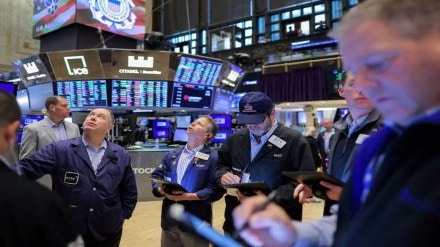By Nigel Green
The recent debate performance by US President Joe Biden has sparked widespread concern among Democrats.
Despite top party leaders ruling out the possibility of replacing him as the nominee, the question looms: What if his next performance is equally lackluster and calls for his replacement grow louder?
This scenario could have significant implications for financial markets, as investors react to the increased political uncertainty.
When political uncertainty rises, markets respond with heightened volatility. The mere speculation of replacing a sitting president as the nominee introduces unpredictability, which investors find unsettling.
The immediate reaction would likely be a sell-off in equities, as market participants seek to reduce exposure to the uncertainty.
In times of political instability, investors tend to flock to safe-haven assets. These include gold and US Treasury bonds. Gold, often seen as a hedge against uncertainty, would likely see its price increase as demand rises. US Treasury bonds, viewed as one of the safest investments, could also see increased demand, pushing yields lower.
Sector-specific impacts
One of the sectors that could be most affected is healthcare. Biden’s administration has been characterized by a moderate approach to healthcare reform.
If a new nominee were to propose more radical changes, healthcare stocks, particularly those of insurance companies and pharmaceutical firms, could see significant volatility.
The tech sector could also react strongly to potential changes in regulatory stances. Biden has maintained a balanced approach to tech regulation. A new candidate with a stricter stance on data privacy, antitrust issues, and/or tech company breakups could lead to substantial sell-offs in major tech stocks.
Meanwhile, the energy sector might experience mixed reactions. A nominee with a stronger focus on renewable energy could boost stocks in that sub-sector while potentially harming traditional oil and gas companies.
In addition, banks and financial institutions might face uncertainty regarding regulatory policies. Biden’s moderate regulatory approach could be replaced by either stricter or more lenient policies, depending on the new nominee’s platform.
The US dollar could face significant fluctuations. Initially, the increased uncertainty might weaken the dollar as investors seek stability in other currencies.
However, if a new nominee is perceived as a strong candidate with clear and stable economic policies, the dollar might recover. Global currency markets are highly sensitive to US political dynamics, and the ripple effects would be felt across major currencies.
In the longer term, markets would adjust based on the new nominee’s policy proposals and their perceived electability.
If a replacement candidate is seen as capable of winning the election and implementing market-friendly policies, initial volatility could give way to stability and potential growth.
Investor Strategies Amid Political Uncertainty
Investors should ensure their portfolios are well-diversified across different asset classes and geographies to mitigate risks associated with US political changes.
Allocating a portion of the portfolio to defensive stocks, such as utilities and consumer staples, can provide stability during periods of market volatility.
Keeping an eye on safe-haven assets and possibly increasing exposure to them can help protect against downside risks.
There’s no doubt that the prospect of replacing President Joe Biden as the Democratic nominee due to poor debate performances and old age introduces a significant layer of political uncertainty.
For investors, maintaining a diversified portfolio, focusing on defensive stocks, and working alongside an advisor are key strategies to circumnavigate risk and seize opportunity in these uncertain times.
(Author is deVere Group CEO and Founder)
Disclaimer: Views, recommendations, opinions expressed are personal and do not reflect the official position or policy of FinancialExpress.com. Readers are advised to consult qualified financial advisors before making any investment decision. Reproducing this content without permission is prohibited.
